#you get a developmental disability. you get a developmental disability. everyone gets a developmental disability
Explore tagged Tumblr posts
Note
do you like think its not obvious that you have absolutely fine in fact very good grammar and vocabulary and comprehension of complex sociopolitical concepts (not to mention esoteric tumblr discourses) but affect a stilted ungrammatical baby "no do this, me don't get it" tone to give an air of being more developmentally disabled than you are when it suits you? Like people notice and can tell. the contrast between your pinned post and so many of your other posts is wild for example. I dont for one instant read your other posts and then believe that "no fake claim me" in ur pinned is a sentence you like organically wrote lol. "politics and conflict make me confused" is also just so laughable given that again you have full clear comprehension of the complexities and contexts of like every facet of fucking tumblr system discourse and complex real world political movements like anti-psych and prison abolition and many many current issues that affect you and have to ability to post very eloquently and frequently about those things with flawless grammar and vocab like. Lol please stop putting on the "me no like me no understand" cosplay and trying to act like thats your normal when that is so SO clearly not how you organically speak or process. its not cutesy its weird and creepy towards people who legitimately do have their grammar and vocabulary limited in that way and arent just choosing to imitate it only when it suits them. I may as well start deliberately posting in a way that implies Im a wheelchair user when Im not!
hello officer, can i help you?
i hope something good happens to you today!
chrome
psa for everyone else - my grammar fluctuates depending on whether i use my aac or keyboard to type. i wrote my pinned post with symbol based aac, but usually type longer posts on my computer. i can speak with nuance on anti-psychiatry (and because it directly is impacted by it, syscourse) because it is something i have experienced and been affected by personally. i still struggle to read most news articles and need them explained to me in simple language.
#chrome barkz#asks are always welcome#i think this is a good reminder for everyone that what we see on the web may not reflect every aspect of someones life with the same#proportions on and off the web#like 80% of the time my grammar sounds like whatever this person thinks im 'cosplaying' as because im using my aac to talk#the other time when i have access to a keyboard and time to compose my thoughts#it sounds like it does now
43 notes
·
View notes
Text
Autism is a disability and I’m so disappointed and disgusted to see how so many other level 1/low support needs autistic people refuse to have any kind of solidarity with the rest of the disabled community.
#it’s giving major ableism when yall get upset and insist autism isn’t a disability#it is!! and that’s okay#that’s not bad#it is Literally a developmental disorder#and even though you can mask and make yourself palatable and relatable#not everyone can and what are you going to do when you come across autistic people that can’t#because honestly from what I’ve seen you’re going to treat them like shit#autism is a disability#autism#actually autistic
24 notes
·
View notes
Text
Where to Start Your Research When Writing a Disabled Character
[large text: Where to Start Your Research When Writing a Disabled Character]
So you have decided that you want to make a disabled character! Awesome. But what's next? What information should you decide on at the early phrase of making the character?
This post will only talk about the disability part of the character creation process. Obviously, a disabled character needs a personality, interests, and backstory as every other one. But by including their disability early in the process, you can actually get it to have a deeper effect on the character - disability shouldn't be their whole life, but it should impact it. That's what disabilities do.
If you don't know what disability you would want to give them in the first place;
[large text: If you don't know what disability you would want to give them in the first place;]
Start broad. Is it sensory, mobility related, cognitive, developmental, autoimmune, neurodegenerative; maybe multiple of these, or maybe something else completely? Pick one and see what disabilities it encompasses; see if anything works for your character. Or...
If you have a specific symptom or aid in mind, see what could cause them. Don't assume or guess; not every wheelchair user is vaguely paralyzed below the waist with no other symptoms, not everyone with extensive scarring got it via physical trauma. Or...
Consider which disabilities are common in real life. Cerebral palsy, muscular dystrophy, stroke, cataracts, diabetes, intellectual disability, neuropathy, multiple sclerosis, epilepsy, thyroid disorders, autism, dwarfism, arthritis, cancers, brain damage, just to name a few.
Decide what specific type of condition they will have. If you're thinking about them having albinism, will it be ocular, oculocutaneous, or one of the rare syndrome-types? If you want to give them spinal muscular atrophy, which of the many possible onsets will they have? If they have Ehlers-Danlos Syndrome, which one out of the 13 different types do they have? Is their amputation below, or above the knee (it's a major difference)? Not all conditions will have subtypes, but it's worth looking into to not be surprised later. This will help you with further research.
If you're really struggling with figuring out what exact disability would make sense for your character, you can send an ask. Just make sure that you have tried the above and put actual specifics in your ask to give us something to work with. You can also check out our "disabled character ideas" tag.
Here are some ideas for a character using crutches.
Here are some ideas for a character with a facial difference (obligatory link: what is a facial difference?).
If you already know what disability your character is going to have;
[large text: If you already know what disability your character is going to have;]
Start by reading about the onset and cause of the condition. It could be acquired, congenital, progressive, potentially multiple of these. They could be caused by an illness, trauma, or something else entirely. Is your character a congenital amputee, or is it acquired? If acquired - how recently? Has it been a week, or 10 years? What caused them to become disabled - did they have meningitis, or was it an accident? Again, check what your options are - there are going to be more diverse than you expect.
Read about the symptoms. Do not assume or guess what they are. You will almost definitely discover something new. Example: a lot of people making a character with albinism don't realize that it has other symptoms than just lack of melanin, like nystagmus, visual impairment, and photophobia. Decide what your character experiences, to what degree, how frequently, and what do they do (or don't do) to deal with it.
Don't give your character only the most "acceptable" symptoms of their disability and ignore everything else. Example: many writers will omit the topic of incontinence in their para- and tetraplegic characters, even though it's extremely common. Don't shy away from aspects of disability that aren't romanticized.
Don't just... make them abled "because magic". If they're Deaf, don't give them some ability that will make them into an essentially hearing person. Don't give your blind character some "cheat" so that they can see, give them a cane. Don't give an amputee prosthetics that work better than meat limbs. To have a disabled character you need to have a character that's actually disabled. There's no way around it.
Think about complications your character could experience within the story. If your character wears their prosthetic a lot, they might start to experience skin breakdown or pain. Someone who uses a wheelchair a lot has a risk of pressure sores. Glowing and Flickering Fantasy Item might cause problems for someone photophobic or photosensitive. What do they do when that happens, or how do they prevent that from happening?
Look out for comorbidities. It's rare for disabled people to only have one medical condition and nothing else. Disabilities like to show up in pairs. Or dozens.
If relevant, consider mobility aids, assistive devices, and disability aids. Wheelchairs, canes, rollators, braces, AAC, walkers, nasal cannulas, crutches, white canes, feeding tubes, braillers, ostomy bags, insulin pumps, service dogs, trach tubes, hearing aids, orthoses, splints... the list is basically endless, and there's a lot of everyday things that might count as a disability aid as well - even just a hat could be one for someone whose disability requires them to stay out of the sun. Make sure that it's actually based on symptoms, not just your assumptions - most blind people don't wear sunglasses, not all people with SCI use a wheelchair, upper limb prosthetics aren't nearly as useful as you think. Decide which ones your character could have, how often they would use them, and if they switch between different aids.
Basically all of the above aids will have subtypes or variants. There is a lot of options. Does your character use an active manual wheelchair, a powerchair, or a generic hospital wheelchair? Are they using high-, or low-tech AAC? What would be available to them? Does it change over the course of their story, or their life in general?
If relevant, think about what treatment your character might receive. Do they need medication? Physical therapy? Occupational therapy? Orientation and mobility training? Speech therapy? Do they have access to it, and why or why not?
What is your character's support system? Do they have a carer; if yes, then what do they help your character with and what kind of relationship do they have? Is your character happy about it or not at all?
How did their life change after becoming disabled? If your character goes from being an extreme athlete to suddenly being a full-time wheelchair user, it will have an effect - are they going to stop doing sports at all, are they going to just do extreme wheelchair sports now, or are they going to try out wheelchair table tennis instead? Do they know and respect their new limitations? Did they have to get a different job or had to make their house accessible? Do they have support in this transition, or are they on their own - do they wish they had that support?
What about *other* characters? Your character isn't going to be the only disabled person in existence. Do they know other disabled people? Do they have a community? If your character manages their disability with something that's only available to them, what about all the other people with the same disability?
What is the society that your character lives in like? Is the architecture accessible? How do they treat disabled people? Are abled characters knowledgeable about disabilities? How many people speak the local sign language(s)? Are accessible bathrooms common, or does your character have to go home every few hours? Is there access to prosthetists and ocularists, or what do they do when their prosthetic leg or eye requires the routine check-up?
Know the tropes. If a burn survivor character is an evil mask-wearer, if a powerchair user is a constantly rude and ungrateful to everyone villain, if an amputee is a genius mechanic who fixes their own prosthetics, you have A Trope. Not all tropes are made equal; some are actively harmful to real people, while others are just annoying or boring by the nature of having been done to death. During the character creation process, research what tropes might apply and just try to trace your logic. Does your blind character see the future because it's a common superpower in their world, or are you doing the ancient "Blind Seer" trope?
Remember, that not all of the above questions will come up in your writing, but to know which ones won't you need to know the answers to them first. Even if you don't decide to explicitly name your character's condition, you will be aware of what they might function like. You will be able to add more depth to your character if you decide that they have T6 spina bifida, rather than if you made them into an ambiguous wheelchair user with ambiguous symptoms and ambiguous needs. Embrace research as part of your process and your characters will be better representation, sure, but they will also make more sense and seem more like actual people; same with the world that they are a part of.
This post exists to help you establish the basics of your character's disability so that you can do research on your own and answer some of the most common ("what are symptoms of x?") questions by yourself. If you have these things already established, it will also be easier for us to answer any possible questions you might have - e.g. "what would a character with complete high-level paraplegia do in a world where the modern kind of wheelchair has not been invented yet?" is more concise than just "how do I write a character with paralysis?" - I think it's more helpful for askers as well; a vague answer won't be of much help.
I hope that this post is helpful,
mod Sasza
#mod sasza#writing reference#writing advice#writing resources#writeblr#writing disabled characters#writing resource#long post#writing tips#writing guide
4K notes
·
View notes
Text
Okay I have been trying to sleep for an hour but can't so I think i have to name this and since tumblr is my public journal I'm doing it here.
Went to hardware store with caregiver today.
Got paint for living room. To get paint need to have person mix the color. Person was clearly queer and noticed me and caregiver as queer as well, had the "i see I'm among family" type interaction, was lovely
But
During the like. 10 minutes. They did not pay attention to a single thing i said (using AAC obviously). They talked a lot to my caregiver. But. They sure weren't talking to me or acknowledging or responding to a single thing I said even when I thanked them at the end.
And. It sucks that queer moments are ruined by ableism. I still am happy to see someone out and about being queer and having that lovely interaction
But I'd honestly rather interact with a cis-straight person who is communicating with me, than an lgbtqia+/queer person who isn't acknowledging my communication. Like. That's not even a question.
So.
I'm sad, I guess. That's what I have to say. I wish the interaction could have just been good, and not have such a sour center.
I am going to try to allow for the possibility that they just did not hear my AAC. It's possible I guess. It wasn't loud enough that I needed earplugs tho and that is usually the measure of if someone within 3 feet can hear my device at loudest volume! But some people are hard of hearing. So. Trying to give benefit of doubt since it had multiple sounds happening.
(But honestly like. If a person can hear what my caregiver is saying they should be able to hear what my device is saying at same range. They were not speaking loudly! We were so close! The store was was quieter than normal! I wasn't wearing earplugs in a public building that's how quiet!!! (I needed them in parking lot and every store ever more of the time!))
And also this kinda thing happens all the time which is why I am more jumping to sad.
It sucks being ignored.
It sucks not being able to speak.
It sucks not being able to partake in normal conversation when I want to!!!!
Everyone learn your local sign language and stop being a dick to people who you view as developmentally or otherwise mentally disabled!! We are still people and have thoughts!! Stop being a dick to people who can't speak. Be patient when someone is using AAC of any sort (speech device, letterboard, communication cards, gestures, etc). Make the effort to communicate with us.
#okay hopefully can sleep now.#ok to reblog if you want because this is common thing ljke. almost every time i leave the house at least 1 perosn i interact with does this#type of thing#it's exhausting.#would link Mel Baggs “Unperson” essay here but. no spoons.#hate being Unpersoned.#ableism#semiverbal#[i'm not nonverbal but i have 0 speech in puclic or with most people]#aac blogging#aac user#isaacfloofs talk#sorry for any errors or nonsense i am beyond tired just needed to share
696 notes
·
View notes
Text
I get confused a lot. I think other people get confused too.
Talk about visible autism sometimes, talk about being visibly disabled. But when talk about it, always get low support needs people saying “yeah, I stim and people notice and stare at me. I’m visibly autistic sometimes”
And don’t think they understand when I say visibly autistic or developmentally disabled. Yes, know that sometimes “visibly autistic” isn’t black and white. Some people do get marked as visibly autistic just for stimming a bit.
But when I talk about visible autism, don’t talk about that. And it can be frustrating. Feels like people talking over me. Just want to scream “you don’t get it”.
Example: was in library yesterday. State Caregivers came with their clients, they sit in library, walk around, watch movies, look at books, eat lunch. They’re required to take their clients out into the community for a certain amount of hours a week, so why not the library? I was there. Was there with my caregiver. Looked over, saw the clients, and saw the caregivers looking at my caregiver with a knowing look. They knew. I knew. Their clients knew. I was like them, and they were like me. Just people sitting in the library who are disabled and require caregivers.
That’s what I’m talking about. That knowing look. That look of pity. That look to my caregiver that says it all. The looks of pity from the librarian. From everyone.
Visible autism for higher support needs autistic people, so much more different than visible autism for low support needs people. And that needs to be realized. Strangers know. And sometimes they don’t know what’s going on, but they all went to school probably, right? They know the special education kids. The “special” kids. Yeah. That’s us. That’s me. They know. I’m tired of people not understanding.
Yes, community. Find middle ground. You’re like me, I’m like you. We are all autistic (those who are autistic), but that doesn’t mean all experiences the same. That doesn’t mean we think, act, eat, sleep, the same. You’re different, and that’s ok.
#zebrambles#autism#actually autism#actually autistic#aac user#higher suppprt needs#nonverbal#actually nonverbal#nonspeaking#visible autism#visibly autistic
809 notes
·
View notes
Text
My friend Tay asked me to help him teach people about the kinds of mobility aids he uses. Tay has a autism and profound intellectual disability, along with a seizure disorder and a chromosomal disease, so he can't use the same kinds of mobility aid you normally see. Not many people know about this kind of aid, so we're going to teach you!
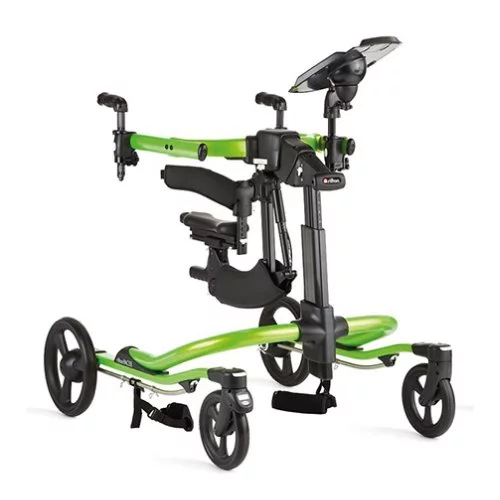
The first aid Tay uses is called a Gait Trainer. Gait trainers are a lot like walkers, except they follow you instead of you pushing them. They're also built in a way that helps teach you to walk better when when you're not using the gait trainer. Tay's gait trainer has a saddle and straps on it to make sure that he's safe and supported. He also chose a cool green color. Gait trainers are commonly used by children who take longer to learn how to walk and people with intellectual disabilities who can't use a traditional push style walker.
Tay says his favorite part of his gait trainer is playing at the park with his friend. His friend ALSO uses a gait trainer like Tay, which is really cool.
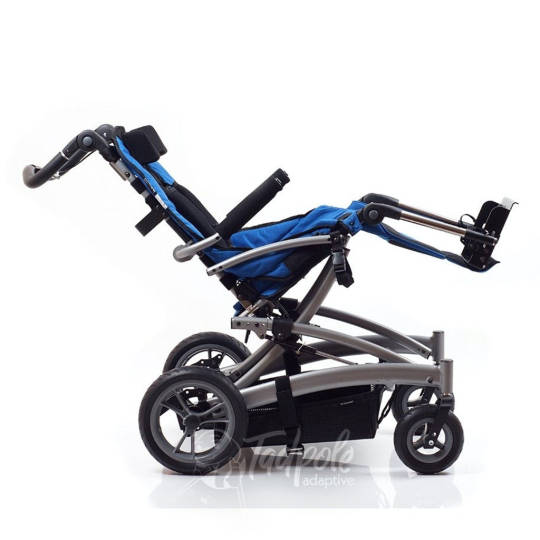
The next kind of aid Tay uses is called an adaptive stroller. Adaptive strollers are a lot like wheelchairs, but with smaller wheels because they're made to be pushed by someone else. These are great when you're like Tay and can't figure out how to push a manual wheelchair or steer a power chair safely. Tay's adaptive stroller, a convaid rodeo, has the same feature my powerchair has, tilt, so that he can stay comfortable and safe when he has to sit in it for a long time. There's also buckles and straps that help Tay stay in the adaptive stroller, he gets help getting the buckles and straps done. Tay says that he can even be tilted back and go to sleep while everyone else is walking when he's in his adaptive stroller!
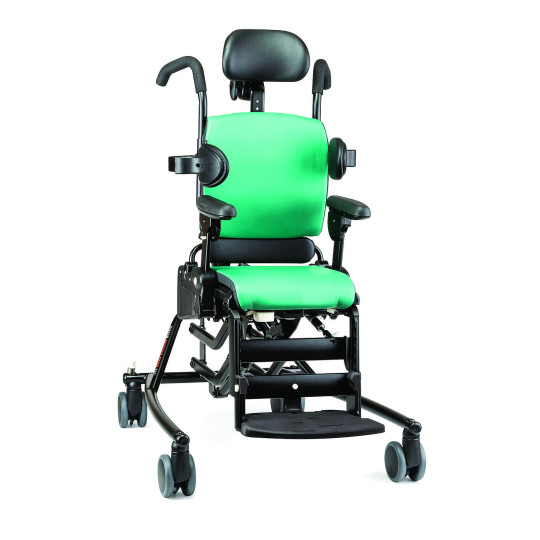
Finally, there's the Rifton Activity Chair! Activity chairs are most often used in places like school or developmental centers because they're great for getting people up close to the table and you're able to adjust the how tall or short you want the chair. A lot of high support strollers and wheelchairs aren't able to get as close to the table, but an activity chair is made just for that! It can go up and down and some of them can even tilt closer to the table. Tay says he uses it to make snacks and play in the water table and do crafts at the developmental center he goes to, he really likes his activity chair.
Thank you Tay for helping teach us! I learned a lot while writing this, and I hope it helps a lot of people learn about what these mobility aids are and why people use them!
#cripplepunk#wheelchair user#actually disabled#disability pride month#intellectual disability#lots of words
6K notes
·
View notes
Text
the way people online have reacted to discussions about physical disability by loudly insisting on discussing the category of "mental disability" actually flattens people's understanding of disability and creates a binary, a mind-body dichotomy stronger than anyone who wanted to just talk about physical disability ever did. like firstly, mental disability historically referred to people with intellectual disabilities (ID/IDD). and two, if you say something like "physically disabled only" you're not actually saying what kind of disabilities everyone else has. only that it's not primarily physical. there's disability that don't really fit into the idea of there being only a physical or mental category. many disabilities straddle the line. like i have migraine. it's a common neurological condition, and it disables me. i personally don't care to put it entirely in either "physical" or "mental" because it affects me holistically. if there's a club saying "people with disabilities that physically affected them are welcome", on the basis on migraine alone i could choose to join, or decide not to. nobody is forcing a category onto me. but people insisting that the opposite to physical disability is "mental disability" is forcing us into categories. just... actually be specific. say mental illness or developmental disability or something. you won't get a word to encompass every disability that's not primarily physical without flattening a lot of frankly unrelated disabilities into one category. it is more accurate and useful to use the categories that exist instead of pretending there's only two categories of disability (physical vs mental) and that they're opposites. for context i have a physical disability, a neurodevelopmental disability (autism), mental illness, and my migraine/neurological issue. those last three are different. i would go to different groups to relate to others with those issues, like for example an autism peer support group or mental health support group. they don't need to be encompassed by "mental disabilities" and treated all the same
356 notes
·
View notes
Text
a lot of people who've watched gravity falls think that stanford is unsympathetic or a bad character, and most of the people who dont think that think stanford is at least selfish and flawed, which i can't really refute, but it always made me feel so awful, and i never realized why until now.
if you look at stanford pines as an allegory for a child with a developmental disability like autism or a "gifted kid", then a lot of the pieces start to fall together.
⚠️spoilers for gravity falls, the website, and maybe a bit of the book of bill⚠️

stanford pines was born with an "extra finger", a symbol for a disability. for a while, everyone thought it was a flaw. he was teased and shunned by his peers,

but then, people began to notice his genius. it even says on thisisnotawebsitedotcom.com, when you enter "sixer" or "stanford", that he has a "hyper-ability", something many people will say about "gifted" autistic people.
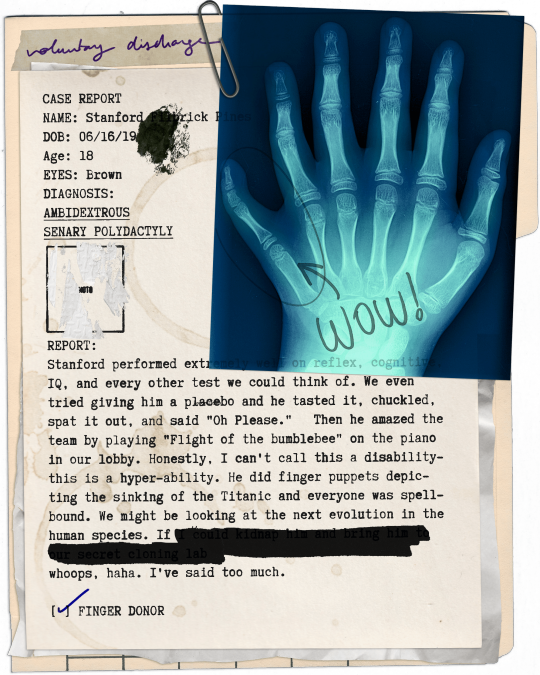
as soon as people started to point this out, everything felt like it made sense to ford. as a person who grew up with autism, i can relate to feeling alienated from my peers, and wondering "why? why, in a world made for normal people, was i made wrong?"
that kind of thought can lead to a sort of delusion.. that maybe you were destined for something great. maybe you were different because one day you would use it to change the world. i believe this is the way ford felt when he was approached by bill
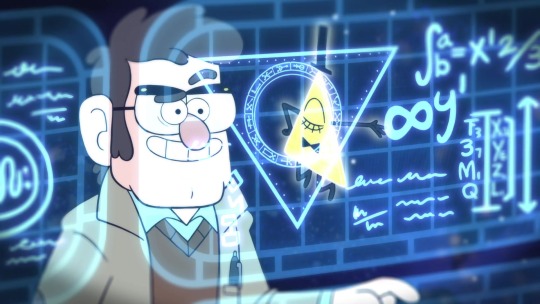
bill came to ford and told him everything he'd ever wanted to hear.. that this feeling was real. that he was destined for greatness. that he was better, smarter, more special than the ones who had shunned him.
bill told ford that building the portal would make him a hero, make people finally see him as more than an extra finger. the one problem?
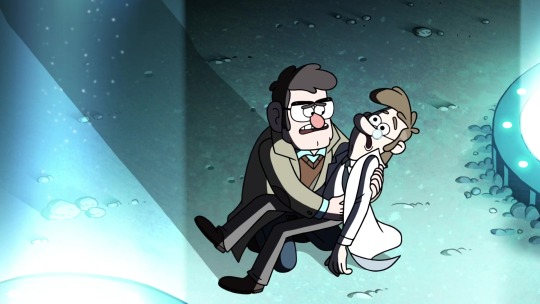
bill was a liar.
he used ford's selfish thoughts to trick him into making a gateway that would end the world. he used the years of mockery, the alienation, the loneliness, and he came to ford when he was alone, trapped, with nowhere to go.
he offered ford the opportunity to get back at a world that was built to knock him down at every turn, a world full of people who would never understand him. he offered to make ford a god.
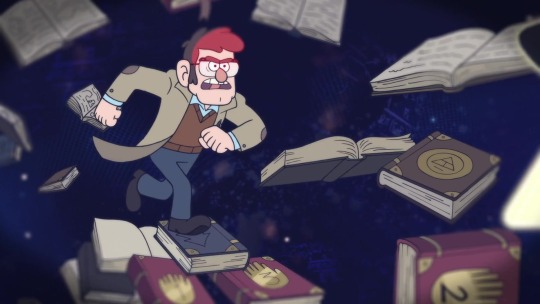
and ford refused
he refused, even in a world that had done nothing but tear him down, to hurt others just to feel better about himself. he only had a few people who had ever cared for him, and yet, he was willing to destroy his life's work to save everyone who had made him miserable.
remember, he fully intended to stay trapped in the portal for all of eternity. that's why he was so frustrated when stanley brought him back. what we saw as a heroic act from stanley, ford saw as stanley refusing the sacrifice he had made to save him. he didn't thank stanley because nobody thanked him. no one thanked him for his hard work or sacrifice or his years of suffering just to protect stanley.
that, of course, led to this scene, which many people saw as stanford's most frustrating moment.
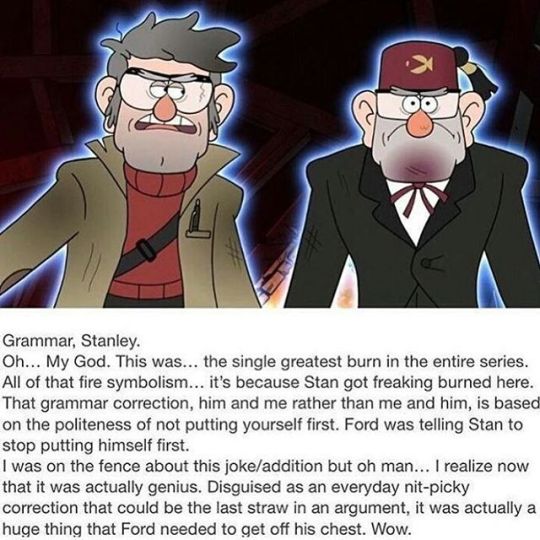
i think this post sums up really well why stanford, in this dire moment, would choose to insult his brother. because stanley was being selfish, too. stanley refused to help save the world, save his brother, all because ford never said "thank you."
they were both selfish. everyone is. they didn't fight because they were bad people, but because they both saw things from their own perspective. they were each hopelessly lonely without each other, but both too prideful to admit it.

in the end, they make up, and both follow their true dream. not money, not fame, just staying together.
stanford pines is not a bad, unsympathetic character. he is a complex, misdirected, "gifted" child. his only flaw was not seeing that he wasn't alone. his family was right there to support him the whole time.
#stanford pines#stanley pines#gravity falls#the book of bill#book of bill#gravity falls spoilers#undiagnosed autistic old man with 7 phDs#autism#undiagnosed autistic#bill cipher#gifted kid syndrome#rant#thisisnotawebsitedotcom#gravity falls theory#gravity falls thoughts#thanks for reading my old man austism rant#this was just really bugging me#I KNEW I LOVED THAT OLD GEEZER FOR A REASON
258 notes
·
View notes
Text
I think we all know on some level that age is a pretty blunt instrument for measuring maturity and capability. We all develop at different rates and in different ways, especially when you take into account environmental factors as well as disability. I said my first words at six months old and didn’t get comfortable walking until I was two. Both of those are developmentally ‘abnormal,’ but in completely opposite directions. Intellectually, I was able to spar with most adults before I was old enough to drive a car, but at age 36 I still cannot handle cooking dinner or doing my taxes. (I also really shouldn’t be trusted behind the wheel of an automobile, if I’m being real).
Research suggests that many Autistic people develop social and emotional skills at a slower pace than most non-Autistics; in our 40s, 50s, and beyond we are still learning a lot of valuable lessons about how to better relate to people, and show less difficulty in our relationships as time goes on. I didn’t learn how to make friends or name my emotions until my 30s — was I not an adult until then? What skills must a person have to qualify as really, fully an adult?
This points to a major problem in how our current systems look at intellectually disabled people — their abilities and needs are often summarized using the confusing metaphor of “mental age.” A person with Down Syndrome who cannot read or use the toilet might be labelled as “mentally three-years-old,” for instance — but what does it mean to be mentally three? Which kind of imagined three-year-old is setting that standard? Which skills are important to determine someone’s mental “age”? If a person can write fluently using an adaptive communication device but can’t tell when they need a shower, what mental age do we give them — and which rights?
Why does ability level determine the rights that a person has, anyway?
In our current society, people considered “children” receive certain resources that nobody else gets, like free schooling and special state-provided health insurance, and if they do not have a guardian they are assigned one. A legal adult gets to make all legal, medical, and educational decisions for the child, and makes sure they remain housed and fed.
There are many adults who could use this kind of support. But relying upon others for such support means you don’t get the rights of a legal adult, according to the Support-Freedom Dichotomy. If an intellectually disabled person can’t understand complicated legal and financial documents, for instance, they’re likely to be placed under a conservatorship and lose the freedom to buy the things they like or live how they want to live. They do have preferences and insight into their own lives, but because they need help carrying those preferences out, they don’t get to make them.
I propose that rather than equating needing support with losing freedom, and instead of trying to define a simple category of people who does not get to be an “adult,” we ask specific questions about people’s needs, capabilities, preferences, and desires in a way that allows for everyone to get both the help and the autonomy they require.
I wrote about abolishing age as a meaningful way of categorizing what rights a person gets -- and what supports they are entitled to. You can read the full piece for free on my substack.
130 notes
·
View notes
Text
How I Work with Pre-K Kids as a Wheelchair User
I've given these tips to enough other wheelchair users that I figured I could make a post about it, and this blog is aligned enough with it that I figured I could post it here.
I've spent time as an administrator for a pre-K and school age programs, and I am also in my final year to be dual certified as a special education/general education elementary school teacher in America. I am also an ambulatory wheelchair user, but cannot safely move without a mobility aid, even when I am standing/walking. SO. Here's a guide/rundown of how I personally talk about disability with the kids I work with!
When First Meeting a Class
You do not need to explain/justify your wheelchair, and any adult who believes you do is probably doing it for their own curiosity and not an interest in the kids.
My personal recommendation is to say you are always happy to answer questions about yourself, and leave it open ended.
If the class had to be rearranged for your wheelchair and you feel comfortable saying so, I will sometimes say "I'm really grateful that you moved the furniture so I could get around. I can't wait to meet everyone!" It makes it clear why the need is there, and if a kid accidentally blocks you you can always ask them to move so you can get through and remind them.
When They Ask Questions
"Why do you use that?"
I respond by asking them what is 'that' - being careful to speak with a curious tone. For young kids, they might not know the word, and will probably point. From there you can say "oh! this is my wheelchair! have you heard that word before? i use it to get around since walking is [very hard/impossible/not something my body does]."
"Why don't you walk?"
I respond by telling them walking is something I can do for a little while, but it really hurts. Link it to a concrete example. "Have you ever gone into a super hot car, and you could do it for a little, but you wouldn't want to be in there all day?" "Have you ever tried to hold snow (or an ice cube) without gloves, and you could do it for a little but then it started to hurt your hands because it was so cold?" Make it personal, specific, and simple - developmentally they may still need support understanding that other people have different experiences (or might be totally unable to yet).
"How'd you get into that?"
I typically respond silly - "Well, I sat down!" If you want to, and you do not need to, you can make this into a (short, keep it short, their brains are so interested in everything and switch very quickly) lesson on transfers/how people get in/around with their wheelchairs.
"What happened?"
I respond by asking them what they mean. This typically leads to another question which I mentioned above. Alternatively I sometimes say "I realize a wheelchair helps me get around safely!"
"How do you use the bathroom?"
My strategy that's worked best is being calm and friendly while saying "I don't like talking about how I use the bathroom." If you can redirect after that (point out something for them to do, change the subject to something they'll find more interesting) it'll make it easier. If they ask why, you can say that everyone has stuff they don't like talking about and for you it's the bathroom.
Physical Interactions With Your Chair
They touch your chair
We had a big thing about this in my pre-K rooms - what we would do is if a kid tried to touch my chair (or did) I would tell them "It's so cool that you want to explore my wheelchair, but I want to make sure you're safe, because there's a lot of moving parts that can pinch you! Can I give you words for when you want to touch my wheelchair?" If no, then let them know you can't let people who can't be safe touch your wheelchair. If yes, give them a script to ask for permission - you will have to repeat it. A lot. Gentle repetition is your friend and within two months my kiddos were asking everyone permission to touch them at school. My script went "Teacher Pecan, can I touch your wheelchair?" "No, now it's a safe time, because [I am moving a lot/I am tired/I need a break/you have a task to do]. We can check in again [when it is a break time/when I feel better/when you finish your task." "Yes, it is safe to touch my wheelchair right now. Can you point to where you want to touch?"
They kick your chair
Every time a kid kicks/hurts your chair, say "ouch! that hurt! my wheelchair is part of my body, it helps me get around!" Repetition and speaking clearly are your friends. If a kid keeps kicking your chair, finding another thing for them to kick (for example, a ball) can help divert the kicking need into something safer for everyone :)
They (try to) sit in your lap
Gently use your hands to get them off or keep them off. Calmly say "Oops! My wheelchair isn't big enough for the two of us!" If they complain/protest, validate and then explain. My script is "I know it looks like a cool place to sit, but my wheelchair is just for me."
They (try to) push your wheelchair.
My last two chairs had no push handles, but my second one did! It can make sense to panic when I kiddo pushes you - I've had them try to push me into walls (by accident). Here's what I did that worked great: Immediately lock my breaks/grab my pushrims, and calmly say "oops! We don't push wheelchairs without permission!" If they stuck around/didn't immediately run away, I would ask them if they remember a time an adult picked them up and took them somewhere they didn't want to go (typically a car). If they say yes, and even if they say no, I explained that pushing my wheelchair feels just like that, and makes me scared. Most children never pushed it again, and everyone stopped after the second try.
Miscellaneous Tips
"Isn't that cool?" is your friend. Any time a kid is first learning about your wheelchair, end the sentence with it. Any time a kid is nervous about your wheelchair and you explain something, end the explanation with it. "It helps me get around, isn't that cool?" "These are called spokes. Aren't they cool?"
Wheelchairs can be grounding tools when you have a good handle on the class and boundaries! Only if you would like to. My spokes on my last chair were rainbow, and I would use my chair to physically get between them and the emotional trigger, and ask them questions about my spokes. "What colors are next to green?" "Can you point to which one is your favorite?" "Hmmm which color do I get if I mix red with blue?"
"Why doesn't [limb(s)] work?" My left foot is (mostly) paralyzed due to nerve damage, and my script is "My brain can't talk to my foot and tell it to move." You can say whatever you'd like, just try and keep it to basic body parts unless the kiddo is super into anatomy.
If they imply/say wheelchairs are bad, or you might be sad for being in one, you can correct them by telling them how cool your wheelchair is! Get them to compliment it too, if their attention span allows. "I don't feel sad about my wheelchair, I love it! I love the color! Do you? What color do you think I should get next?"
In conclusion - talking calmly, positively, and using repetition of the same words/scripts is a great way to not just exist in a classroom hassle free, but to get kids comfortable with disability/mobility aids at a young age. I have had kids get pinched by my chair (he grabbed my axle from behind), and luckily I had my higher ups on my side and they agreed that I made every effort to keep the kids safe (plus he learned his lesson lol, he always asked permission after that). Your mileage may vary based on admin and their attitudes, so play it by ear, and change any of my tips as needed. Feel free to send questions to this blog too. :)
#wheelchair user#mobility aid user#physically disabled#actually disabled#wheelchair tips#wheelchair meta#not comics
272 notes
·
View notes
Text
"we want more mentally ill/disabled characters with ugly symptoms!"
You guys can't handle lapis lazuli tony stark or hank pym! You guys can barely contain your ableism toward the hulk! You guys hate the good doctor for all the wrong reasons! You made fun of his speech patterns and his meltdowns wtf like I'm sorry the only autistic person you've supported have been the perfect non annoying type- but too many of especially as children are like shawn- they talk weird and don't understand what's so offensive about what they said
You guys keep saying Lapis should just be rewritten into a villain! I don't like how the show handled her but like your really gonna make the girl who shows ugly bad symptoms of ptsd into villain? You guys keep trying to make hank into a villain or rewrite his past- god forbid a character have really sevre ugly symptoms that causes them to make decisions that permanently effect the story but have them still be heroes! God forbid Ironman have npd and be a hero! Let's shame MCU Bruce for his mental illness for being unable to do things because of it! God as soon as a character with a mental illness or developmental disorder or low IQ shows actual symptoms and behaviors (ei: acts like how someone with the disorder in question acts- you know the main part of having a fucking disorder) you get pissy and pile on the shame- yeah jen you do control your anger better than bruce- you can also stand better than Charles fucking Xavier! Yeah your smarter than a guy with a low IQ want a cookie?
I'm never gonna be one of those people who tell others to stop writing disabled villains or that writing a character that deals with internalized ableism (disabled people like any group of people can be total prices of shit, and I'm sorry not everyone is content and accepting of their disabilities and some of us take comfort in characters that struggle with being angry because of their problems) but Jesus Christ when a heroic character with ugly symptoms who makes cruel decisions or has 'bratty' or 'immature' moments can we let them stay heroes? Can we let them have a disorder without piling on the shame that we are inferior because we can't do something everyone else can- because that's literally what a disability is! Can they still be heroes?
Do we have to use intellectual/developmental disability as a shorthand for anti intellectualism and being a gross annoying psycho
Do we have to make every heroic character with aspd or npd into a villain or change their disability to autism because it's 'more sympathetic' as if lack of empathy isn't a goddamned symptom of many disabilities like PTSD and autism- You can headcanon tony as having autism- that's cool by me but it's clear some of y'all do it to make him a 'woobie'- which is infantalizing btw but also it's because some of y'all are ableist toward people with npd
I hate that the only acceptable 'ugly symptoms' are things like forgetting to shower or brush your teeth every once in a while or being a bit irritable and not stuff like burning bridges or having explosive outburts
Also it's not a mental illness unless it effects your behavior?
Im not saying that we should just accept and allow mentally ill/intellectually disabled people/characters to get away with bad behaviors unpunished but can they stay heroes? Can they still be respectable?
"we want more characters with ugly symptoms"
Yet
You people get offended by low functioning autistic people existing! You get mad at them for being incontinent or nonverbal/making strange noises or having scary anger issues or IQs low enough that they will never be independent you get mad at them for not showing the 'appropriate' reactions to things they may or may not fully understand- you hate people with sensory issues -
You don't want mentally ill/disabled characters- you want characters with the labels of mental disabilities without any of the ugly strange or off putting behaviors mental/intellectual deficiencies/issues cause- you want a romantic tragedy!
You shame people with Alzheimer's for FORGETTING stuff and LOSING SKILLS 'yeah yeah you are superior to your uncle because you can remember stuff but can you remember it's a fucking disease! you people are cruel
Yes you are technically superior to disabled people because you are capable of things we aren't and you have better character and you can control yourself but guess what? Those people you hate for being incapable of that shit have disabilities it's not our faults! It's the fucking definition of a disability! Like yeah it is a skill issue and we're just 'worse' than nondisabled with us lacking self control and having lower IQs and bad mental processing- yeah it is because we're lacking in some capacity that's like the definition disability you can't say you support disabled people and then turn around and say shit about how your better than these people because you can talk or take care of yourself
Hank Pym and Lapis Lazuli should get called out for acting like assholes and pieces of shit but I am firmly against turning one of few heroic characters who actively struggle with psychosis and delusions into another 'psycho' villain and I'm firmly against saying Lapis is just as bad as Jasper and using symptoms of her PTSD as signs she should be rewritten into a villain- I want them to be held accountable not turned into straight up evil guys or dear god washing out their problematic qualities until they're palatable/relatable to a neurotypical audience to make them good guys when they are already good guys!
Can people who do bad things because of their disabilities still be heroes? Can they be allowed to get better or do they have to accept that having ugly symptoms means being the bad guy? Fucking hell this is why I side eye anyone who acts like mental illness/developmental/cognitive or mental etc disabilities are more destigmatized than physical disabilities (trust me they aren't)
Tldr let characters with ugly symptoms be heroes let your characters with mental disorders act like they have a disorder and let said characters be heroes inspite of it!
#hank pym#lapis lazuli#tony stark#Bruce banner#The good doctor only proved how much of disability acceptance is performative nonsense#I'll give that show shit for writing unbelievable shit#Shawn being unable to drive while relatable makes no sense- with his career he'd freaking lose his job so fast#But I'm not forgiving anyone who mocked the meltdown scene or the way he talked#Or the fact he did lack skills and therefore you are superior to him because he does struggle with these skills#Go fuck yourself I don't care if you are 'technically' superior- if your a bully than go fuck yourself#abelism#saneism#Tony has npd deal with it#Tony is a hero deal with it#Tony is morally grey deal with it#Tony Stark stans and antis see zero nuance with the man#You guys are somehow worse than Terra antis and fans in Teen Titans#And that's saying something#I hate how Lapis treats Peridot it's bad#And I hate how Hank Pym stans are anti wasp or act like he's done nothing wrong#But I will fight anyone who wants to make them into villains#This is something of vent I guess?
91 notes
·
View notes
Note
Howdy! I’m working on a story with a side character who has mild to moderate intellectual disability from fetal alcohol spectrum disorder.
The character really likes dinosaurs and I was considering having the character buy presents for his family members all with dinosaurs because that’s what makes him happy. But I was wondering if this would perpetuate harmful stereotypes? Any insight wanted thank you!
I was also wondering about writing his speech and how his family talk to him. I’m assuming they use simplified language? But I’m not sure what that looks like in general conversation.
Hey!
If it's not presented as child-like or "stupid" by the narrative, I have no problem with it - seems realistic to me. I know a person from who attended SPED with me who did basically the same thing (except not dinosaurs specifically and with more or less everyone rather than just family members). I also appreciate an intellectually disabled character that's shown to have some deeper characterization to them, so that's cool to see.
Speech/language/verbality is a more complicated thing. It's a really broad spectrum in the context of intellectual disability. Some people will have it essentially unaffected - either because their ID is mild, or they have a specific disorder, like Williams Syndrome, where language doesn't tend to be affected much - and some have it be very obvious. To my understanding FASD doesn't specifically affect language abilities more than 'regular' intellectual disability.
If your character has mild ID, there's a chance his linguistic skills won't affect the dialogue 90% of the time. You can have him ask another character for clarification on what they said, for example, or ask them to reword a run-on sentence because he got lost 2 clauses ago. He might have poorer intuition when it comes to pronouncing an ambiguous word for the first time (for example, not noticing the pattern that the word is built on and breaking the syllables up incorrectly). He could have a particular tone of voice (most commonly: monotone) that you could mention in the dialogue tags. But things like incorrect basic grammar or misunderstanding everyday words are not a feature of mild ID (on its own at least).
Many people with mild ID aren't "obviously ID" to most people, and that includes speech. Others can often tell something is different, but in my experience it's often chalked up to autism, [insert a random developmental condition that person happens to know], or even poor hearing (some people might talk very loudly, which is what HoH/deaf people are often stereotyped as) since the average person seems to assume that a person with intellectual disability wouldn't be able to talk at all, or they don't even consider the possibility that a person with ID could exist near them (as opposed to being in an institution).
As for how people talk to him, that's a completely separate thing. You could have a situation where a mildly ID character knows someone and they have completely normal dialogue, but then the other character learns about the other's ID, and they suddenly turn to babytalk. Is this appropriate; no, the disabled character could clearly hold the conversation previously, is this realistic; absolutely.
However, yes, your character could need other people to alter how they speak to him, especially if his ID is more severe than just mild (and as always: it's not infantilization to have your needs met). Here you have some of the most common and realistic options of what happens (I'll use much simpler sentence examples than what would actually need to be simplified for the sake of clarity):
The bare minimum. This is what happens when someone is kinda trying, but not really. Maybe they don't have the patience, maybe they just didn't think about it too much. Either way, the disabled character doesn't get the full picture and is effectively left out of the conversation. E.g.: "Oh, yesterday Zainab and I went to the club and met up with her boyfriend and his annoying older brother, we wanted to grab some drinks there, but they were just so overpriced." = "I went out yesterday."
The "don't worry about it :)". Pretty much what it says. The other character decides that the disabled character doesn't actually need to hear that; they decide that it's irrelevant for them. E.g.: "Ever since her rent increased my mother has been doing nothing but worrying sick, and she won't even let me help her out." = "Don't worry about it."
The actual simplified version. The gold standard of simplifying something is actually making the person understand what you are talking about without leaving out information, or leaving out as little as possible. Depending on the actual text, it might not always be possible (you can only get so far in simplifying scientific subjects, for example), but in terms of regular conversation you can probably accurately simplify the vast majority of things being said. An example I like to use is English Wikipedia vs Simple English Wikipedia, some of the main features are shorter sentences, more commonly used words (when appropriate), and they use fewer pronouns in favor of repeating nouns. It's not perfect, but I think it illustrates what I mean by "simplification vs baby talk".
To figure out how his family speaks to him, you need to think about who they are as people and what's their relationship to him. An impatient person might just wave their hand and keep talking even if the character asks for clarification, while someone else might automatically switch how they speak when he enters the room to make him feel included. It's also a great way to show-don't-tell what the family dynamics are towards the disabled character.
Some of the posts about ID and language speech: 1, 2.
Hope this helps,
mod Sasza
116 notes
·
View notes
Text
hey btw everyone- people with mental disabilities can and, very often do, experience sexual attraction, get horny, have kinks/fetishes/paraphilias, masturbate, have sex, etc. this includes people with intellectual disabilities and/or any kind of developmental disabilities.
please stop acting like mentally disabled people Never have Any sexual wants/needs when that is so unbelievably untrue that by saying that, youre just admitting that you have obviously never interacted with more than a handful of mentally disabled people, if any at all.
i see it all the time (particularly irl when i talk about my job) where people will try to say that mentally disabled people cant have sex because they're basically children or because they dont understand it or because they cant make their own choices or it would always be coercion or they never ever want it themselves and that just isnt fucking true????
mentally disabled people can make their own choices, they know what feels good to them and what doesnt, they understand when they want to do something and when they don't. mentally disabled adults are not "like children". mentally disabled people are capable of being sexual. sure, some mentally disabled ppl are asexual, just like some able minded people are asexual. because mentally disabled people are human beings, just like everyone else
#fungal spores#this was inspired by some of my coworkers & i privately discussing the various different kinks/fetishes of some of our clients#and it got brought up how so many people genuinely believe that disabled people are all universally asexual/sex repulsed#and we were just laughing about it bc its literally Visibly untrue#disabled#actually disabled#mentally disabled#mental disability#intellectual disability#developmental disability#autism#actually autistic
533 notes
·
View notes
Text
Big Radqueer Survey Results
This is going to be pretty long. I may in the future take sections from this (+ maybe elaborate) and make them their own posts. Disclaimer that any viewpoints discussed below are not necessarily my own and that I am trying to approach this from a place of pure curiosity and am not including my own moral stances. Thank you everyone for taking the survey. We’ll get started under the read more!
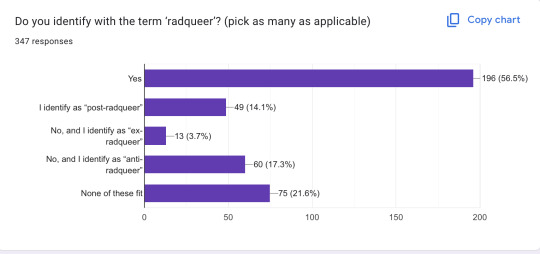
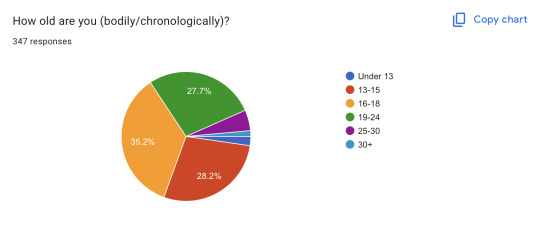
Alright, so immediately we’re working with a large radqueer majority audience, so keep that in mind! There is some diversity overall, but this did end up being a very pro-radqueer heavy population. Fairly normal age distribution compared to the rest of tumblr, I’d say, though I would take note of the majority 13-18 population and significant under 16 population.
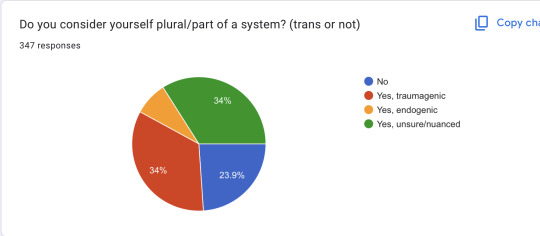
Big piece of data here!! Interestingly enough, about 76% of responders identified as plural or part of a system. Based on written responses, it appears like a lot of people cite their plurality as a reason for having certain transIDs. I got a few responders who stated they were answering as multiple alters and therefore there answers may be contradictory. There seem to be a minority of endogenic systems, with most people either answering ‘traumagenic’ or that they’re unsure/nuanced about system origin.
—TransIDs: Racial, Age, Abled—
I believe the visual charts for these look a bit busy, so I will summarize the main points I got here:
Out of being transabled, transage, and transracial—being transage is the most common according to responders. Most transage folks identify as being younger, but age sliding/experiencing several ages depending seems to also be common. Compared to the other types of transIDs listed, more people seemed to identify as transage due to trauma (others seemed more related to atypical dysphoria + wanting the label for fun).
For transabled people, identifying with both physical and mental disabilities is most common. Besides that, mental is more common than physical. More people reported being transabled ‘for fun’ compared to the others (though again, atypical dysphoria was majority reported). From what I’ve seen, identifying with life-long disorders (developmental, intellectual, chronic, etc) is more common than identifying with temporary conditions.
The majority of transracial people reported being bodily white, though not by a wide margin. Based on general tumblr demographics, I’d say there’s not really compelling data there to say whether bodily white people are more likely to identify as transrace within radqueer spaces than others; though, as one might expect, it seems that bodily race/ethnicity can have an influence in the different nuances as to *why* someone might identify as a different race/ethnicity.
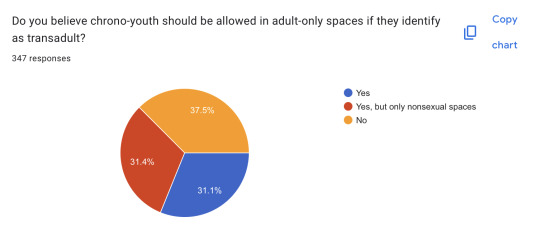
I don’t have anything in particular to add to this graph, I just wanted to include it here. It’s surprisingly pretty evenly split.
—TransIDs: Harmed/Harmful—
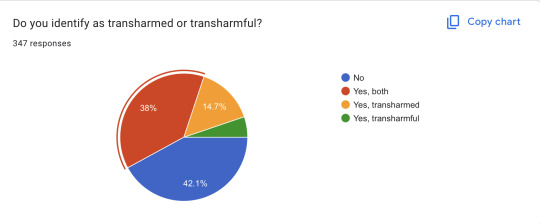
Responses to these were actually really fascinating and helpful. I could write a whole other post on it, honestly.
I’ll do my best to summarize here.
The majority of people who identify as transharmed/harmful fit both labels. You can see this in the chart. Besides that, transharmed seems more common than harmful.
Based on written responses, it is very clear to me that identification with these labels tends to stem from trauma. Though some also claimed they take them on for fun or for sexual reasons, many *many* people specifically talked about wishing their trauma was worse. Over and over again I saw sentences like, “I feel like my trauma wasn’t valid”, “I feel like it should’ve been more severe”, “people would believe me if I was more traumatized”, “I wish people would take my issues more seriously”.
This is a very common mindset among people struggling with trauma and/or mental illness. Many responders reported having these feelings about past experiences with grooming and childhood abuse. Feeling like something bad should’ve happened to you when you were younger is also often a sign of CSA or other traumatic memories that one might’ve blocked out; in other situations, it may also come from a lack of support for already existing issues.
In some cases, seemingly more commonly in those who identified with the transharmful label, people might seek out this transID to cope with or mitigate guilt from intrusive thoughts. It can be an outlet for anger, some reporting that they find a type of relief in fantasizing about hurting the people who hurt them, or hurting people in the same way they were once hurt. For many, transharmed/harmful was also related to plurality—specifically the existence of fictives/introjects and their own memories of their source material.
Though some expressed distaste for the way the general radqueer community seems to have conflated transharmful/harmed labels for kink and the want to seek out conabusive relationships, there were several people who said that they identified with these terms for specifically erotic reasons.
There was also a common theme of gratefulness for a space to express commonly taboo desire in a way that minimizes potential for harm. Especially for people who were once abused, being able to experience these things in a controlled environment was important; the desire to return to abusers themselves is considered common, so the want to recreate some aspects staying away from actual abusive situations was noted as incredibly helpful.
As some did point out in the survey, the similarities between conabuse and (sexual or nonsexual) BDSM are very apparent. Consent was consistently reiterated as necessary to many of these people, though a few also expressed concern with the way conabusive relationships have played out specifically in online spaces.
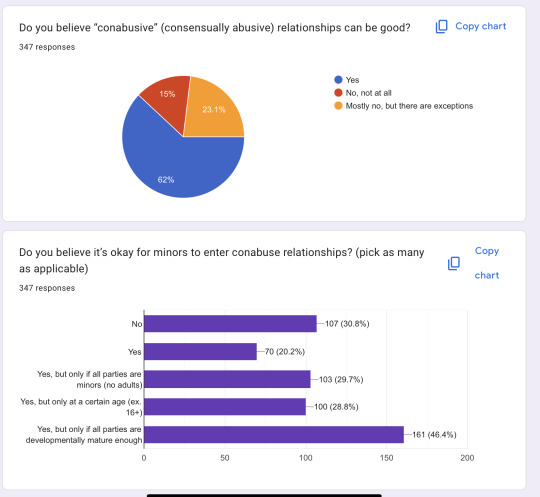
The majority of responders were positive or nuanced towards the concept of conabusive relationships. The question of minors engaging in such relationships seemed like it really depended on the individual situation for many. Maturity especially was a big factor.
—Contact Stances for ‘Big Three’ + Incest—
(TW for… all the stuff that’s involved in discussing that)
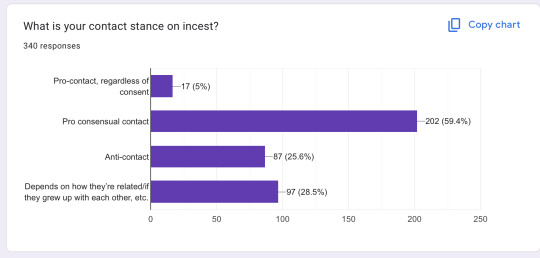
Just to preface, the reason I including the ‘regardless of consent’ answer was mostly for the section on beastiality, necrophilia and pedophilia—online, I have rarely seen the opinion that engaging sexually with beings that do not understand or relate to our societal concepts of sex (or are… corpses) cannot be harmed by it. I am also aware that some people simply don’t care about committing harm. I included it here for consistency.
Consensual incest was definitely one of the more accepted ‘taboo’ acts in this survey, with a majority of ~59%. Although, it’s important to note that for many people the pre-existing relationship of those involved would make a difference in their opinion.
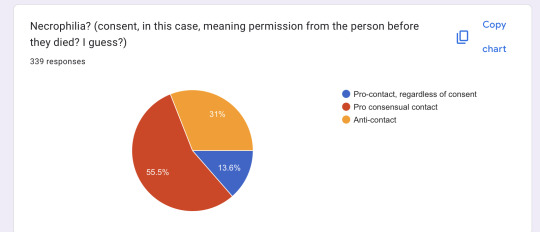
Necrophilia was overall the most supported (adding up both the red and blue sections of the pie chart there). In written responses, I also saw people claiming that conditions such as relationship to the deceased and likelihood of contracting illnesses would also be relevant to their opinions. Interestingly, there seemed to be a higher percentage of anti-contact here than for incest; some who chose such an option mostly highlighted the issue of dead bodies not being able to revoke consent during the act, and therefore not having the ability to be fully consenting at all.
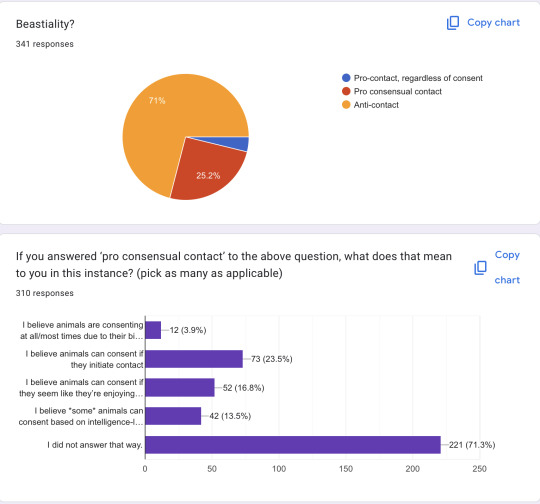
Zoophilia was not supported by the majority (71%). ~25% of responders believed consensual contact with animals was possible; out of those who did, the belief that animals can consent if they initiate contact was most popular (followed by perceived enjoyment and intelligence level). Interestingly, I got several responses from people who labelled themselves as either pro or anti contact zoophilia who claimed that they believed sexual contact with animals *could* hypothetically be done ethically, but that the vast majority of people do not have the knowledge of animal behavior and biology to do so.
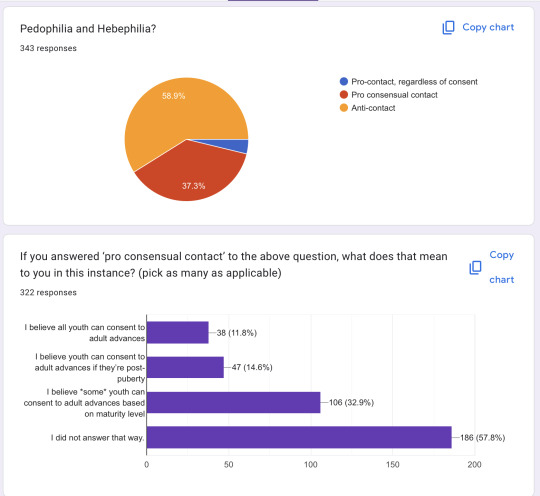
Pedophilia/Hebephilia was considerably more divisive. Comparing the pie chart here with the data below, I believe it would be accurate to say that we have a majority (~59%) of people who believe youth cannot consent to adult advances, and others whose opinions seem to be more situationally-defined. Keep in mind that not everyone who answered the first part answered the second.
According to written responses, those that were pro or nuanced on the issue tended to prioritize maturity level and sexual education for minors. Some people claimed that kids of almost any age should be able to express consent to (a few specified: non-penetrative) sex in a society that better educated children on their bodies and relationships. There seemed to be a group of people who agreed that, philosophically, children have the capacity to say yes or no to sex in the same way they would for anything else—most of these people, though, agreed that this would not work in our society due to the prevalence of CSA and lack of protections for children.
I found it interesting that more people identified as anti-contact for zoophilia than pedo/hebephilia. I saw two or three responses that claimed it was mostly an empathy issue (more for animals, less for children); but a more common outlook seemed to be that—while some minors have the ability to communicate what they want and understand the culture we have around sex—animals cannot meaningfully consent within the framework of our society.
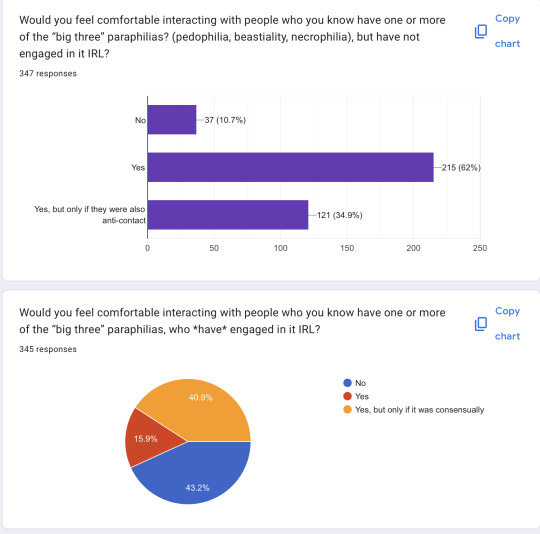
As we can see here, the majority (62%) of people would feel comfortable interacting with people who had one or more of the ‘big three’ paraphilias, but have not engaged in them. For many people (~35%) there is the additional caveat of being anti-contact.
For those who *have* engaged in any of those paraphilias, comfortability interacting falls significantly. There’s still a majority of people willing to interact (adding the yellow and red sections together), but most of the people in that category (~41%) would only be comfortable if they considered the other persons’ contact consensual. ~43% of people would not feel comfortable interacting at all.
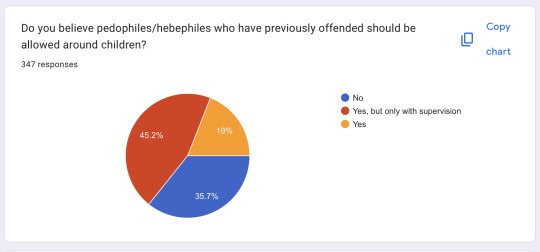
I don’t have a ton to say on this chart, but I thought I’d include it here.
—CENSORSHIP—
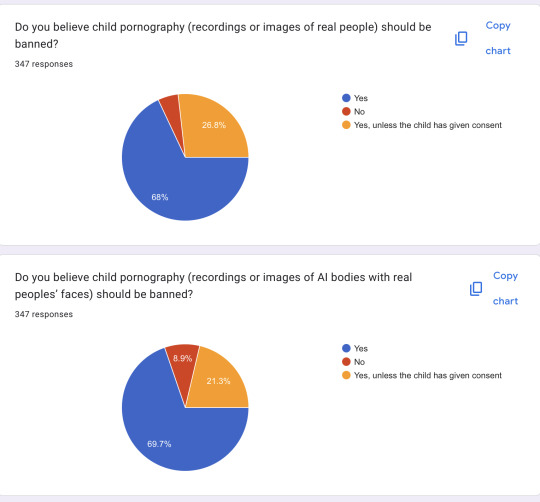
I have less to say in this section, but I find it notable that (admittedly, by a small margin) people found the ethics of AI child pornography featuring real children’s faces (but not bodies) more disagreeable than fully real images of children. Also notably, ~27% of responders believe children can consent to keeping sexually explicit images/videos of themselves available. Based on written responses, I believe some or most of this percentage comes from people wanting it to be acceptable for youth to keep/potentially distribute nudes of themselves without fear of legal repercussion.
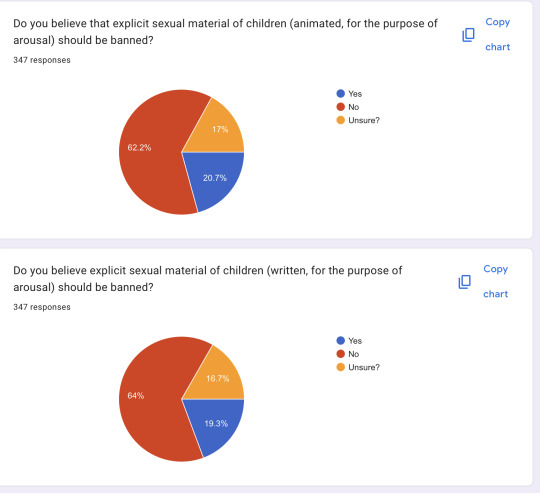
Here we have a majorities for not banning sexually explicit writing or animation portraying children. As I expected, writing has a little more support than visual depiction.
—CONCLUSION, NOTES—
Again, I want to thank everyone who participated. The survey will continue to stay open if you haven’t taken it and want to add your own perspective.
I still have some questions, particularly regarding the diversity in definitions of consent I saw, as well as some of the more… ‘cosmetic’ (?) based TransIDs that I’d be interested in understanding the thought behind.
I feel like I have a much better understanding of some of the psychology behind a lot of this, at least. I won’t go into any ultimatums here, because I believe they might be influenced by my own ethics, but I’ll just say that much of this community is very understandable if you take an empathetic approach. It’s interesting that an online culture so focused on being able to identify as ‘other’ in a very individualistic way seems to have also brought many people into community that they were seeking. There’s quite an emphasis on the shared solidarity between different “deviancies” (as societally-defined), and for better or for worse this has led to the public broadcast of the many diversities of opinion these people have on some of the most taboo subjects one can think of.
#radqueer#ex radqueer#post radqueer#transid#transabled#transage#transharmful#transrace#transharmed#anti rq#social research
134 notes
·
View notes
Text
I honestly get frustrated when low support needs people say that a professional diagnosis is a privilege. It’s true, but not in the way they think. Some of them are like “I need a professional diagnosis so I can finally get validation for myself and my needs.” But you don’t need a professional to validate you. I get why you want that, but you can validate yourself and take your own needs seriously. You don’t need a professional diagnosis for that.
Meanwhile there are people who desperately need a diagnosis for vital services and can’t get it due to cost. There are higher support needs autistic people who were visibly disabled as children who never got a diagnosis of autism or another developmental disability because of severe medical neglect.
I know people with higher support needs that have showed obvious signs of autism from VERY early childhood to the point schools repeatedly pointed it out. The parents never tested their children or listened to the schools’ concerns. I know a person with high support needs that was in and out of institutions their entire childhood and doesn’t have a diagnosis of autism because their adoptive parents hid or destroyed their medical records and tried to pretend they had a non disabled child.
These people are unable to get access to the services and supports they desperately need. They are left completely stuck. They can’t get disability benefits or paid support people because they don’t have a diagnosis. Most are only even alive because of a close partner takes care of them. If they had been diagnosed when they started showing obvious signs it would have been in early childhood or when they entered school.
A diagnosis isn’t a privilege for medium, high, and even some low support needs people. It’s a fucking necessity. When some medium and high support needs people don’t have a diagnosis they can die because they don’t have services and can’t care for themselves.
When a late diagnosed low support needs person who can mask very well and has a high paying white collar career doesn’t get a diagnosis they don’t get emotional validation and can’t wear headphones at work.
Ok I know that isn’t entirely accurate and I’m being harsh. I just want to show that the stakes are nowhere near the same. I know low support needs people struggle. But higher support needs people can literally die without support.
And when some people whine about “oh my precious validation” they miss the fucking point. They don’t understand how for lots of autistic people a diagnosis is the only way they can get support in any official way. When professional diagnosis is framed as a way to prove yourself right, instead of as a way to get services it hurts autistic people. Especially the most marginalized autistic people and autistic people who need a diagnosis out of necessity.
Also high support needs people who did get a diagnosis in early childhood are NOT privileged. The main reason they did get an early diagnosis is usually that their symptoms were so visibly disabling people couldn’t ignore it.
Calling a professional diagnosis a privilege feels like calling food or housing a privilege. Technically it is a privilege if you enough food because many don’t. But food is a RIGHT, not a privilege. Because it’s required for survival. For some autistic people a professional diagnosis is required for survival. So it’s not a privilege. It’s a right.
If anything making it until your 30s until anyone notices anything is wrong is the privilege. Because that means that your autism wasn’t causing a significant delay in milestones like talking, toileting or other activities. There may have still been some delays looking back, but they weren’t so obvious that everyone noticed and intervened.
So a professional diagnosis is necessary for lots of autistic people and framing it as a privilege makes it seem like it’s something you’re lucky if you have. But for many people a professional diagnosis is their only option. A diagnosis is a right. And people can die without one.
#actually autistic#autism#i/dd#self diagnosis#professional diagnosis#low support needs#medium support needs#support needs#discourse#privelege#it’s complicated
66 notes
·
View notes
Note
A few people have defended Chloe and Lila's writing by saying that teenagers being just as capable of heroism as adults means that they need to be just as capable of villainy as adults. I know that's not good logic, but I can't put my finger on WHY it's not good logic, can you weigh in on this?
I actually don't think it's bad logic at all. They're right. Teenagers are absolutely capable of being monsters. A teenage bully may not have the wide reaching impacts of a terrorist, but teenage bullies still do real and lasting harm that can shape victims for the rest of their lives.
This is why you have to be really careful when it comes to redeeming either of these characters (and also Sabrina since she's almost as bad as Chloe in my eyes). You cannot minimize the harm that they've caused by saying "well, they're just kids" or even by pointing out that Chloe and Sabrina were victims of abuse.
Fourteen-year-olds are more than old enough to know right from wrong. Yes, they're not full adults yet, but they're in the stage of life where they're learning how to be adults. That's why we call them young adults! People in this stage of life are very capable of understanding that their words and actions can hurt people. Heck, three-year-olds are capable of that! If you don't think that these teenage characters understood that bullying Marinette was hurting Marinette, then you're arguing that these characters have some sort of developmental disability or psychological disorder or something of that nature that is effecting their development in an extreme manner. If so, then that requires immediate serious intervention by professionals, but I don't think that anyone is making that argument for anyone save, maybe, Lila.
On the abuse side of things: being a victim is not a free pass to hurt innocents. Victims don't get a magic ticket that says, "you may now do one free abuse" every time that they're abused. By that logic, giving Audrey an abusive past would absolve her of everything that she did to Chloe. The same goes for Gabriel and Adrien, which is why this is such shitty logic. Nothing justifies Gabriel and Audrey's actions. What they did to their children was wrong.
The same logic applies to all characters and all types of abuse. Victim status doesn't prevent you from becoming an abuser. It's actually quite common for abuse to lead to more abuse which is part of why you can't grant exceptions on the basis of victim status. If you do that, then you eventually reach a point where no one is accountable because everyone has been abused and is therefore a blameless victim who can do no wrong. No one wants to live in a world like that.
There is of course, a lot of nuance to this topic and a lot of it is heavily situational. For example, I totally believe that certain exceptions have to made for extreme cases that I'm not going to give examples of to avoid triggering content, but you can probably think of some. However, we're not talking about extreme cases here. The characters that we're talking about are reasonably normal fourteen-year-olds. Young adults who have been allowed to be part of society and who know that what they're doing is wrong. And if they don't know that bullying and terrorism are wrong? Then we're back to the concern that something is deeply wrong with these characters and they need immediate serious intervention from trained professionals.
To be fair, Lila may end up being that kind of character, but Chloe and Sabrina certainly aren't. Since Chloe was the character mentioned in the original ask, we'll focus on her for the rest of this. While Chloe has absolutely been abused, she's not some isolated victim who has no idea how the world works. She's been allowed a reasonably normal childhood. This scene from Malediktator is actually pretty solid writing for a character like Chloe:
Ladybug: I'm fine with helping you, Chloé, but first… I need you to tell me what happened. Why is your father— I mean, Malediktator, so mad? Chloé: It's because of this super lame loser named Marinette Dupain-Cheng. She's this horrible girl in my class and she hates me. (Ladybug looks angry, but then contains her feelings) She's ganged everyone up against me and she— Ladybug: Maybe this Marinette girl isn't entirely to blame? Chloé: Uh! Ugh. Okay, it wasn't totally Marinette's fault. She is really mean to me sometimes, but actually, this time, Daddy got angry all by himself. Ladybug:(not buying it) All by himself? Chloé: Yeah, because… there was something he couldn't do… Ladybug:(puts a hand on Chloé's shoulder) Chloé, it's me, Ladybug. You can trust me. You can tell me the truth. Chloé: I— I— Ladybug: Mm-hmm. Chloé: It— it was me. I hurt my daddy's feelings. Because I want to leave Paris, forever.
She knows right from wrong and she knows when she's hurting people. She just doesn't care most of the time because she's never had to face consequences for causing harm so why should she care? It's not like it effects her! This is why she only cares about the damage she causes when it effects her or the people she loves.
That's not a deeply messed up world view. A lot of people only have strong feelings about things effecting those they love. Chloe just needs to work on being more neutral to people outside her circle because that's how we make a happy functioning society. (This is a hint of that nuance I mentioned before. I'll give a few more hints as we go on, but we won't really be digging into it due to word count. Just know that I'm aware of it.)
Giving Chloe an abusive past didn't absolve her of her actions. It just gave us a potential reason for why she does what she does. This actually does make Chloe's abuse important! Once we know the reasons why her character is doing something, we can then understand her character and better guide her story. Understanding that she's a victim means that she can be helped because this isn't some inherent part of her. It's learned behavior and that means that she can unlearn it.
And now we get to circle back to the original ask and discuss why it's still valid to be mad about Chloe and Lila's treatment and why it IS bad even though it's not wrong to have "evil" teenagers.
The reason why Chloe and Lila's lack of redemption is concerning is because full grown adults who have done far worse things are being redeemed based on nothing while these two teenage girls are being treated as beyond hope. If Gabriel Agreste and André Bourgeois are allowed to have happy endings without doing anything to earn those happy endings, then why are Chloe and Lila being treated as devils? What message is this show trying to send to kids? That it's okay to be a terrorist as long as your reasons are good, but be a bully at 14 and you're doomed for life? That's total BS!
It's especially concerning because Chloe's bad treatment of her adult father is being used to justify his redemption while Audrey and Andre's terrible parenting is not being used to give Chloe a similar free pass. Writers, wtf are you doing? No one should be getting a free pass in this situation. They all need to take action to right their wrongs if they want to be redeemed. Andre shipping Chloe off to live with her mother is an adult man saying, "oops, raised that one wrong! We'll let's just pretend that never happened."
Don't get me wrong, Chloe's actions are still fully her own and she needs to own that, but crying, "Daddy" only held power because Andre did whatever Chloe told him to do. He held all the power and was happy to misuse it in order to make his daughter happy. That means that he holds blame here, too. He allowed his daughter to become a total brat by encouraging bratty behavior.
This was not a situation where Chloe was a danger to others for some reason. A situation where Andre was truly doing the best anyone could hope to do in order to keep his daughter placated so that she didn't physically hurt anyone. It was also not a situation where forces beyond Andre's control were effecting his daughter and shaping her personality while he was desperately trying to guide her down the right path. It was just plain old terrible parenting. He spoiled Chloe rotten, got the completely predictable end result, and then threw her out for a better version that someone else raised. What an uplifting message! (That was sarcasm.)
Chloe and Lila would have worked reasonably well in a story where all of the important characters were teens. A story where Lila was always the big bad, Gabriel was a minor character, and Chloe's parents never got any screen time.
That's not the story that the writers wrote, though, so the "teenagers can be evil" defense falls flat because if domestic terrorists aren't evil and child abusers aren't evil, but bratty teenage girls are, then what are we even doing here? This is extra true because the people this show is aimed at are not adult men. They're little girls who may very well relate to Chloe and Lila.
There's also the issue of Chloe being dammed while other teen characters were given a free pass for no real reason. Felix, Sabrina, and Kim have all done equally bad or even worse things. Felix is especially uncomfortable because he's basically a male Chloe who did all of the same actions - and often did them better - yet he doesn't have to give so much as a simple apology for what he's done. He's just good now because Kagami needs a boyfriend.
Chloe outed herself in public while emotionally compromised? So did Felix and he had weeks to plan before hand, too! Chloe did it in a totally reactive manner without any real plan.
Chloe used the miraculous that Gabriel stole? Felix stole the miraculous himself and gave them to Gabriel!
Chloe bulled Marinette? Felix bullied Adrien!
Felix even did some of the same things as Lila! He tried to ruin Adrien's friendships via manipulation and deceit in his first appearance. He knew Gabriel's secret and used it to his own advantage instead of telling the heroes. He used a major terrorist attack as an excuse to further his own goals. The list goes on! So why is he being welcomed onto the team with open arms? And why is no one telling Kagami just how dangerous her new boyfriend is? She wasn't there for most of this so she has no idea who she's dating.
And this isn't even touching the mess that was Derision's terribly delivered message about owning your actions and not blaming others for your bad behavior. That episode makes everything about Chloe's treatment look even more hypocritical.
In summary, the issue is not that teenagers can't be bad guys, they absolutely can! The issue is how all of the other bad guys and bullies are being treated compared to these two and how inconsistent the rules are. Of course, we haven't seen all of Lila's story, so who knows what the end game is for her. Maybe she'll also be trying to restore a dead wife and so she'll get a free pass, too.
81 notes
·
View notes